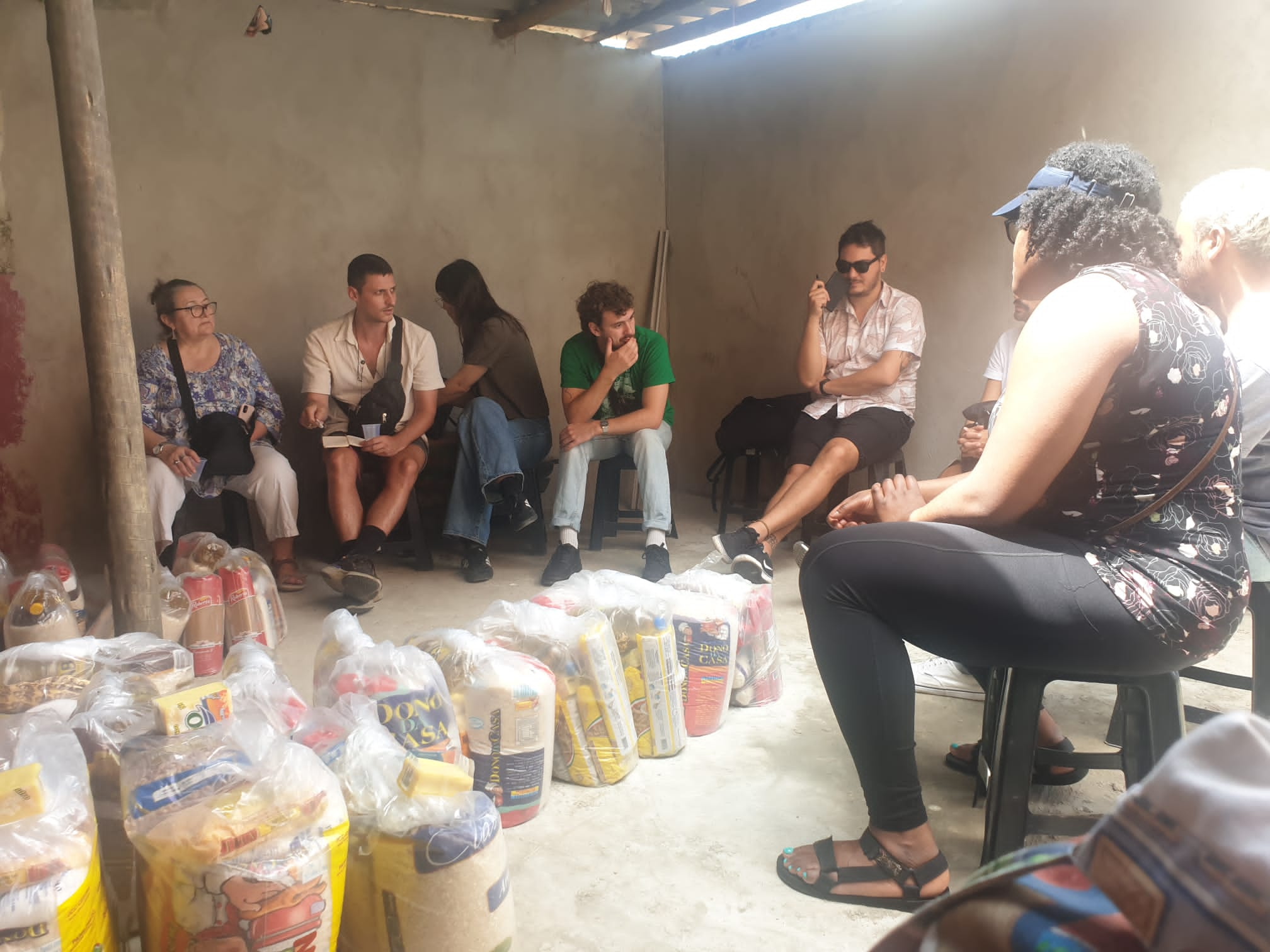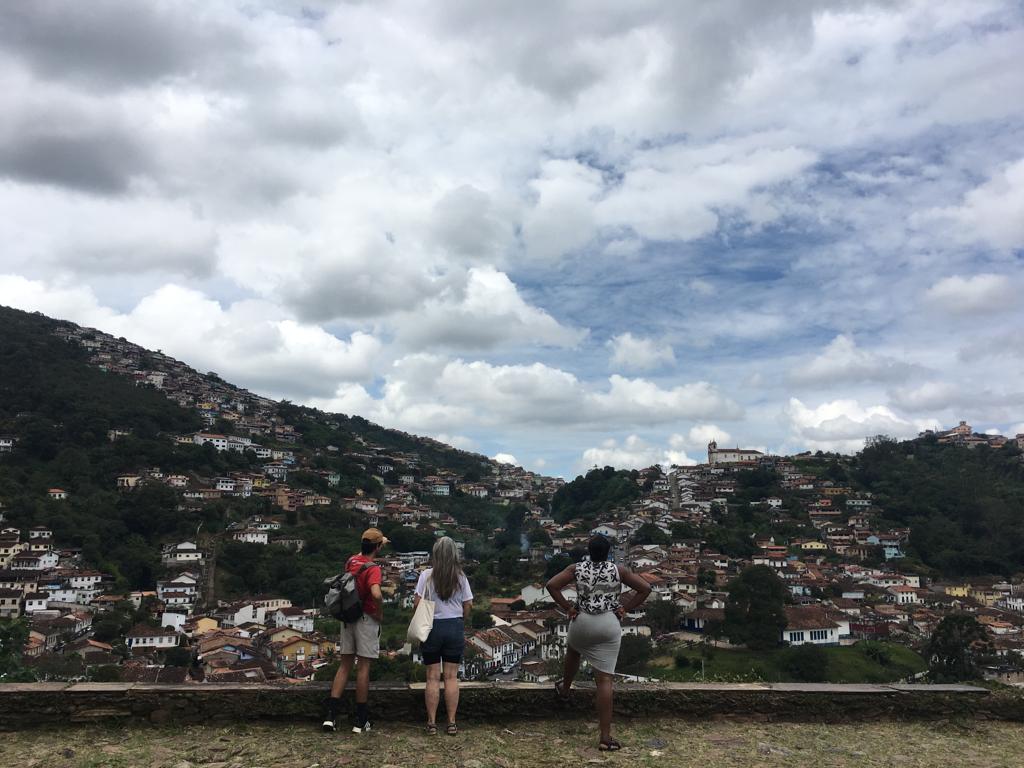Postcard From The Road
by Stephanie Guirand
6 June 2023
 Ouro Preto, Minas Gerais, Brazil ︎Nikos Vrantsis
Ouro Preto, Minas Gerais, Brazil ︎Nikos VrantsisI spent the winter term as a visiting doctoral researcher at Institute for Housing and Urban Research (IBF) at Uppsala University in Sweden. I went to Sweden at exactly the time to produce my best work, January through March, when the days are short and very cold. The invitation was extended to me by Professors Migel Martinez and Irene Molina, with the latter serving as my in-country supervisor. I have so much gratitude for everyone at the IBF. They offered kindness and patience to me while I learned about the Swedish housing context and observed the cultural importance of the many fika (coffee breaks) throughout the day.
In addition to the gift of being at the IBF, I was offered an unimaginable opportunity. I was invited by Professor Irene Molina to attend the Militant Research and Activism Around the World conference, organised by Uppsala University and the Universidade Federal de Minas Gerais, to be held in Belo Horizonte, Brazil, in March 2023. Very special thanks to Professor Rita de Cassia Ribeiro for all of her work in organising the brilliant conference and shepherding us all around the Belo Horizonte.
In a previous blog post, I have mentioned the challenges I’ve had with my academic research, especially my time doing fieldwork in US. Some of my research comrades have ended up in prison, one was shot in the head, others have disappeared to try their luck elsewhere, and some I’ve lost track and contact with altogether. The people I have worked with are struggling to meet their basic needs in the richest country in the world. I desperately wanted to offer options for solutions, and I wanted to see them through their rough patches. Needless to say, my fieldwork was tough on me. I’m still coping with the trauma.
I went to this conference in Brazil where there were researchers from the global north and south. We were all discussing the struggles of being at the strained intersection of both activist and researcher. Rita offered the apt term acadevist. The conference was the therapy I didn’t know I needed. I didn't realise how many points of tension I was carrying in my work. Whether it was the challenge of needing to pull away or missing meetings to reflect and write. Or feeling I'd extended myself too far toward activism or research or vice-versa. Or wanting to be helpful and giving what I myself cannot afford to lose. Or going observationalist and being called out for it. Feeling perhaps academia is not quite right but being unsure of other options. And even the positive questions in workshops like, ‘What can academia and activism produce? Sharing and producing tools together.’ The space, the people, and the discussions felt like group therapy.
One group of researchers chronicled the challenges in the favelas, The Brazilian term for working class neighbourhood in Rio de Janeiro. There were a few Swedish researchers who were looking at renovictions:, the act of renovation of properties that results in changing demographics, in marginalised and non-homogenised neighbourhoods in Sweden. There was a Greek scholar who worked with community members to map and reclaim abandoned houses in the north of Greece.
 At the land occupation in Mina Gerais ︎Nikos Vrantsis
At the land occupation in Mina Gerais ︎Nikos VrantsisNothing solidified my sense of belonging more than the two outings we took. One trip was to in the city of Belo Horizonte. We visited a cluster of squats in the heart of the city. Community members were occupying and rehabilitating vacant buildings. One of the researchers, Clarissa Campos, was working with community members to map the squats in space and time. She identified the growth of the squat movement in the city. A leader in the squat movement, Renato Corrêa, was also in attendance at the conference. He had been conducting interviews with folks and taking photos of the buildings to archive the positive impacts of the movement. He is working to publish this work as a book – Talk about what community activists and researchers can produce together!
A few attendees were doing research into land occupations in the region. One prominent acadevist, comrade Vivian Tofanelli, took us on a tour of an occupation miles outside of the city. Over 400 families are occupying land owned by a family. The land was desolate; it went neglected for decades. The people took the land and transformed it into an oasis. They built homes and raised gardens there. There were roads named in honour of other occupations. They proudly described the community-developed sewage system. The gardens provide food for the community, and it operates as a community-supported agriculture (CSA) system, which sells agro-ecological food to folks in the city, which funds projects and financially sustains the occupation. They talked about their challenges too, of course. For one, they have issues with creating systems of accountability to address conflict. And further, they lack enough jobs and responsibility for all members of the community. But they are on the verge of a major victory. The municipality is in the process of purchasing the land from the landlords, which would allow the people to remain in this community and have access to government funding to build further infrastructure to sustain the community. This outing was so inspiring. I needed to know that people were winning.
I was the sole researcher working in the United States. I talked about being employed by my community as a researcher in the development of a community response program. My work with the community responders has been as a housing specialist. A great majority of the crises are somehow connected to the challenge of staying put. Whether the crisis is a connected with mental health, or material needs, or domestic violence – a housing concern is never too far away. For about four days we exchanged stories, ideas, coping strategies, and resources. It was truly the ‘therapy’ I needed to get through this next phase in the thesis development process.

Looking out over Ouro Preto, Brazil ︎Nikos Vrantsis
No doubt the greatest takeaways were the people, the stories, and the experience of my trip to Brazil. I can’t help but be grateful for my luck to have been invited. I was invited to a ‘group therapy session’, just in the nick of time.
A special thanks to Ase Richard, Maria Walstam, and Nikos Vrantsis for making all of the arrangements for my stay both in Sweden and Brazil.
My trip to Sweden was funded, in part, by a generous grant from the Graduate School at Goldsmiths, University of London.
To my CUCR colleagues at Goldsmiths, I send my best.
Hello from the road.
Stephanie Guirand is a PhD candidate at Goldsmiths, University of London in the Sociology Department. Her thesis project focuses on housing policies and programs including public housing, section 8 vouchers, and inclusionary zoning.
︎ Background image : Zoe Walsh

